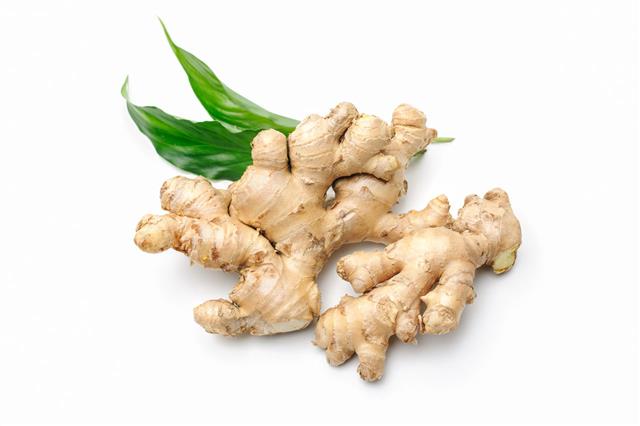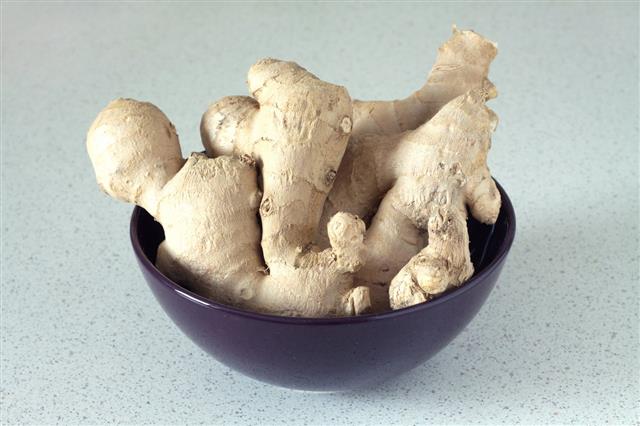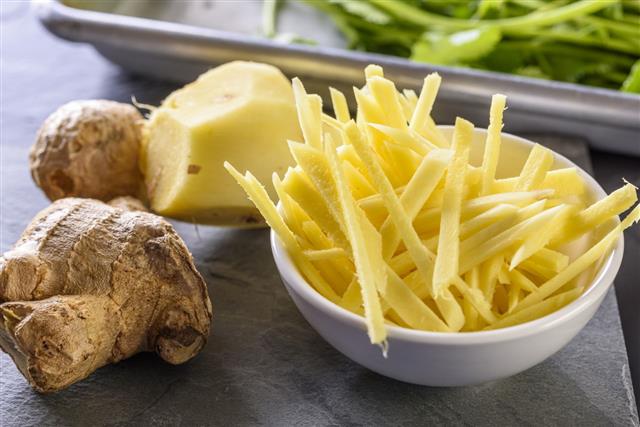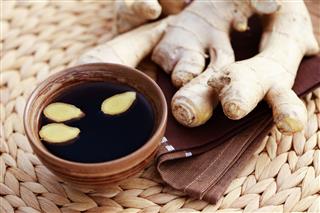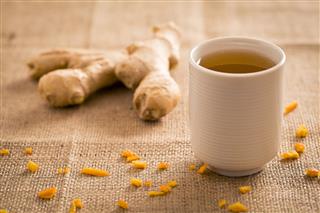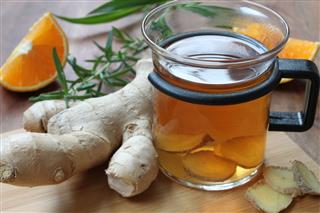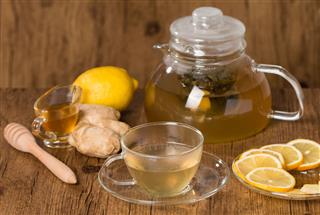
Ginger tea is not only a refreshing beverage but is also full of health benefits. Here is an account of ginger root health benefits, side effects, along with a few ginger tea recipes.
The use of ginger spread to East Africa and the Caribbean. Ginger tea has been used as a remedy against flu and colds for centuries both in India and China, as well as other countries in the East. According to Chinese culture, its powerful yang energy is what warms the lungs and stomach. Ginger root tea has been used in China for 2,500 years to treat sore throat, nasal congestion, and sinus pain.
If you should sink your teeth into a fresh piece of ginger root, you will feel the sun’s fire coursing through you, as some anonymous person so eloquently said.
Rich in minerals like calcium, copper, magnesium, potassium, and zinc along with being a grand source of vitamins B, C, and D, here is why you should drink ginger tea often.
Ginger Tea Benefits
Treating Nausea
Ginger tea is an excellent repulser of nausea which may be a result of morning sickness, naupathia (sea sickness), motion sickness or some other reason. Drinking an early cup of this beverage and carrying ginger tea on days that one needs to travel long distances keeps vomiting at bay. Pregnant women can drink this tea whenever feeling queasy but only after consulting a doctor.
For Pain and Inflammation
Ginger also alleviates pain and inflammation in the body. Not only does it assuage headaches, migraines, stomachaches, sprains, lower back pain, muscle strains, it also lessens muscular and connective tissue swelling, stiffness and pain. So, it is a grand reliever of arthritic pain and discomfort. Bathing a swollen body part in ginger tea works wonders.
When Suffering from Athlete’s Foot
Victims of athlete’s foot can soak their feet in this beverage to relieve themselves of the constant itching and burning sensation.
Treating Cancer
Ginger tea has been found to prevent and treat cancer in studies conducted recently. While a research conducted by the University of Minnesota found ginger to effectively decelerate the growth of colorectal cancer cells thus, preventing colon cancer. In his book “The New Healing Herbs”, Michael Castleman has talked about the potential of ginger to shrink cancerous tumors. More studies however are needed to conclusively state anything.
According to some researches conducted of rats afflicted with diabetes, ginger decreased the relative frequency of occurrence of diabetic nephropathy. However, it has not been tested and verified for humans as of now.
A study conducted a few years back clearly indicated that men who drink ginger tea regularly show a rise in libido and sperm count, not to mention the role it plays to treat erectile dysfunction.
Treat Cramps
Soaking a towel in warm ginger tea and placing it on the stomach or lower back during menstruation helps relieve cramps in a big way. It soothes the taut muscles and prevents blood from clotting.
Maintain Cholesterol levels
It is known to keep the bad cholesterol levels (LDL) in check and boost the good cholesterol levels (HDL).
Weight Loss
Ginger tea is a thermogenic beverage which effectively means that it produce enough heat within the body to burn down fat deposits and thus aiding quick and healthy weight loss in people. It also curbs the chances of cardiovascular attacks for it unclogs arterial blood vessels very effectively.
Minerals and amino acids that are present in ginger boost the circulation of red blood cells (RBCs) that contain hemoglobin – the haemoprotein that transports oxygen from the lungs to the different tissues of the body. The thermogenic properties of this tea are attributed for this and the benefits are two-fold. One, it facilitates better blood circulation all over the body which in turn keeps fever, excessive perspiration and chills at bay. Two, it arrests the chances of a cardiovascular hit.
Treating Cold
The competency with which the antioxidants in ginger tea strengthens the immune system in humans is comparable to very few other things. By drinking ginger tea one can harness the affinity of a cold to lower the defenses of a man to a great degree and also get rid of the condition as quickly as possible. It loosens up phlegm and dilates the lungs to provide relief from congestion and sinusitis.
Acts as a stressbuster
This beverage is known to be an excellent stressbuster. Its soothing aroma acts as a relaxant for the brain and relieves the body of emotional strain. According to dietician Alice Mackintosh, Ginger contains a potent antioxidant, gingerol, which helps cleanse the harmful chemicals our bodies produce when we’re worried, so ginger can help psychological stress too. This greatly aids asthma patients who are often fall prey to heightened stress and anxiety.
Treat allergies
Ginger tea actually provides relief when experiencing allergic conditions like hay fever.
Bloating after meals, redundant belching, diarrhea, flatulence, indigestion, and stomachaches can all be gradually reduced by regularly drinking a cup of ginger tea. Ginger has active ingredients called shogoals and gingerols that soothe taut and irritated stomach muscles by subverting acids in the stomach. This results in the proper emanation of digestive juices that consequently leads to the optimal absorption of food.
Ginger tea is also believed to be a very effective appetite enhancer. As explained by Mackintosh, Ginger can help as it stimulates the taste buds, triggering digestive secretions.
Ginger works actively to deter harmful substances like alcohol to derogatorily affect the liver.
Ginger Tea Side Effects
The problems start when this tea is drunk excessively and without discretion. The same conditions it treats when drunk in moderate proportions will afflict you and in a worse manner if you do not know where to draw the line. Heartburn, acidity, belching, indigestion, lack of sleep due to restlessness are only a few possibilities that will make life difficult.
~Ginger tea is a blood thinner. While this helps make it a great booster of blood circulation, it can actually spell danger for hemophiliacs and those already on drugs to thin blood. Those taking medicines that cause drowsiness, are beta blockers and immune suppressants should keep away from this tea.
It is also because of this that patients about to undergo surgery are asked to stop taking ginger tea at least 7 days before the procedure because it can interact with the anesthesia given to the patients and subsequently stall the healing of wounds due to resultant photosensitive reactions and the inability of the blood to coagulate.
~ Diabetics are anyway warned to keep away from consuming a lot of ginger. Ginger tea can reduce blood sugar levels in them which will lead to hypoglycemia and pose them in greater danger.
~ According to a study by the University of Maryland Medical Center, drinking excessive amounts of ginger tea on an empty stomach may give rise to gastrointestinal disorders.
~ Heartburn, acidity, belching, indigestion due to lack of sleep induced by restlessness can be a result of excessive ginger tea consumption.
~ Drinking ginger tea when afflicted by gallstones is a bad idea as it only makes the condition more painful. This is because the beverage is known to enhance the production and secretion of bile and bile emission is already an excruciatingly painful process for gallstone patients.
Ginger Root Tea Recipes
Here are a few refreshing ginger tea recipes that you can brew and sip to enjoy the unique flavor and aroma of this wonderful herb.
Plain Ginger Tea
This has an invigorating, spicy taste and is used as a home remedy against cold, sore throat, flu, nausea, and indigestion.
Water, 4 cups
Ginger, a 2-inch piece (fresh)
Lemon slice
Honey (optional)
First, peel and slice the ginger root. Put the water in a saucepan and bring it to a boil. Add the slices of ginger to the boiling water. Reduce the heat, cover the saucepan and let it simmer for about 15-20 minutes. Strain the liquid out and add lemon and honey to taste.
Crushed Ice Tea
This makes a lovely refreshing tea, ideal to drink after a sweaty workout or on a hot summer day.
Water, 4½ cups
Lemon, a few slices
Ginger, a piece (fresh, thinly sliced)
Sugar syrup
Ice (crushed)
Put the water in a saucepan and bring it to a boil. Add the sliced ginger and turn off the heat and let the ginger tea steep for about 15 minutes. Strain out the ginger and refrigerate the decoction until it is cold. Remove and sweeten with sugar syrup, then pour it into tall glasses which have crushed ice in them and garnish with lemon slices.
Ginger and Lemongrass-flavoured Tea
This feels wonderful if you drink it hot when you feel the flu or a cold coming on. It can be served either hot or chilled. It is especially comforting when traveling by car, boat, or airplane, since it alleviates feelings of nausea.
Lemongrass, 1 stalk (sliced lengthwise)
Lemon, 1
Water, 4 cups
Ginger root, 2 tsp. (fresh, grated)
Herbal tea, 2 tsp.
Honey
Bring the water to boil then reduce the heat and add the grated ginger and lemongrass. Let it simmer for ten minutes or so. Turning off the heat, add two teaspoons of any herbal tea. Strain the tea and add honey to sweeten and lemon for that extra flavor.
Spicy Ginger Tea
If you are bored with the same old cappuccino or café au lait, try this. Not only is it a yummy alternative, but it is low in calories and fat.
Ginger, 4-5 slices (fresh)
Cardamom, 4 pods
Cloves, 4
Water, 4 cups
Milk, 2 cups (low-fat)
Assam tea leaves, 4 tsp.
Orange peel, a few strips
Brown sugar, to taste
Put the water, cardamom, ginger slices, orange peel and cloves in a saucepan and let it boil. Then cover and simmer for about ten minutes. Add the tea leaves and milk and simmer for another two minutes. Turning off the heat, allow it to steep for about 4-5 minutes, or according to how strong you want it. Strain the tea and add sugar according to taste. Serve hot.
Ginger Chamomile Tea
For 4 invigorating cups, you will need:
Chamomile tea bags, 4
Lemon rind, 1 strip (large)
Lemon juice, yield of 1 lemon
Ginger root, a 1-inch piece (peeled, thinly sliced)
Water, 6 cups
Honey, ⅓ cup
Pour the water into a pan and place it on heat. To this add the lemon rind, sliced ginger, and honey and bring it to a boil. After that, pour in the lemon juice, stir once to mix well and then transfer the concoction to a teapot. Now, steep the tea bags in the hot solution for a while, strain and serve hot.
Note:
You can also make tea by adding a drop of ginger essential oil to one cup of hot water.
It is not advisable to take aspirin within two hours of drinking ginger root tea since both are blood thinners.
Too much consumption may cause heartburn.
Ginger root tea should be consumed warm to derive all the benefits optimally. If the tea is spicy for your taste, then the quantity of honey in the tea can be increased.
Disclaimer: This NutriNeat article is for informative purposes only, and should not be used as a replacement for expert medical advice.
